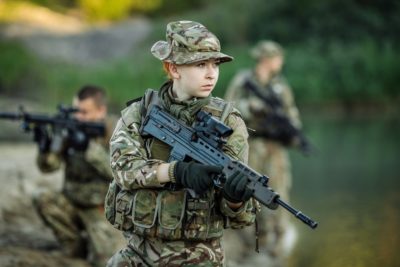The armed forces and special schools
ForcesWatch comment
Their piece, Army recruiters accused of targeting vulnerable children at Scottish special schools, is based on research we did on visits to special schools over recent years: ‘In 2016-17 alone, there were six visits by forces personnel to special schools around Scotland. The schools included Edinburgh’s Gorgie Mills School, Willowbank School, Coatbridge, Kear Campus in Blantyre and Westmuir High School, Glasgow.’
The question is why such a massive remit would be given to an organisation whose primary purpose is defence rather than educational, if no recruitment outcome was expected?
While giving evidence to the petitions committee, the Army confirmed they “support” schools with special needs, along with other schools: the Army’s aim, is ‘to support all schools, whether independent, state sector or special needs and regardless of postcode area.’ As we said to the committee in our submission: the question is why such a massive remit would be given to an organisation whose primary purpose is defence rather than educational, if no recruitment outcome was expected?
We commented that: ‘We feel that it is unacceptable for the Army to visit special schools and primary schools, as younger pupils and those with additional needs are particularly vulnerable to sophisticated marketing messages.
‘Research shows young people with the greatest pre-service vulnerability are likely to fare least well when they enlist.’
Recent research about adolescence as a developmental stage indicates that not only is this an extended period – going into the early 20s – but that young people are particularly vulnerable to long-term risks and the marketing messages that inform taking those risks. More details on the implications of this for recruiting under-18s into the armed forces can be found in this report by the public health charity Medact.
This link between pre-service vulnerability and future mental health problems is now well established, as shown in the oral evidence recently given by leading researchers to the Defence Committee inquiry into Army Forces and Veterans mental health.
By appealing to the desire to belong, the Army have latched onto a very powerful recruitment tool, in particular among adolescents who feel isolated or marginalised.
Leaving the services early (during training or before the minimum term of their contract) is also well understood to be a risk factor for difficulties regarding future mental health and life prospects. Younger recruits have a high drop out rate so this makes them particularly vulnerable.
The current Army recruitment marketing campaign – This is Belonging – is designed to appeal to youngsters who are looking for a group to be part of. As we said in our critique of the This is Belonging campaign, by appealing to the desire to belong, the Army have latched onto a very powerful recruitment tool, in particular among adolescents who feel isolated or marginalised. These young people will be the most vulnerable to the risks of serving in the armed forces, and are likely to be highly represented at special schools for those with learning or behavioural difficulties.
See more: military in schools/colleges, risks, ForcesWatch, Scotland, Scottish Parliament, education
Like what you read?
> Sign up for our newsletter or blog notifications
> Support our work – from just £2 a month










